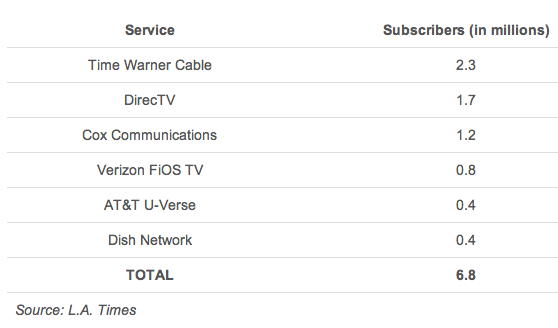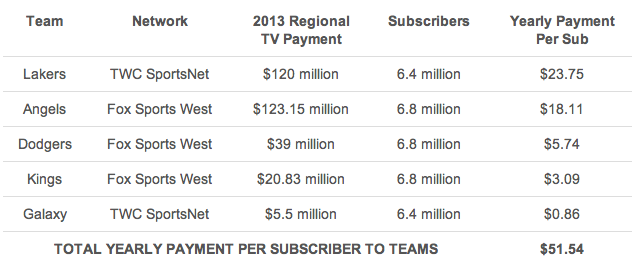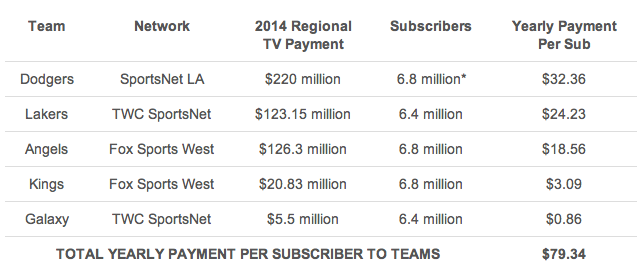
This post originally on Dave's site, What You Pay For Sports. Dave will be contributing from time to time in addition to occasional syndication of his work.
If you need a prime example of just how much money regional sports networks can suck from your wallet, look no further than the City of Angels.
In the last three years, Los Angeles sports fans have been bombarded with news of their local teams signing TV deals with RSNs worth more than $13.3 billion. The L.A. Lakers kicked off this money grab in early 2011 by signing a 20-year, $3 billion deal with Time Warner Cable, which led to the launch of TWC SportsNet. That network then struck a 10-year, $55 million deal with the MLS Cup-winning L.A. Galaxy.
Having lost the Lakers, Fox Sports West ended up making a 20-year, $3 billion deal of their own with the L.A. Angels of Anaheim the following December. Six months later, Fox Sports West and the Stanley Cup-winning L.A. Kings agreed to a 12-year, $250 million extension.
Then came the biggest bombshell. Time Warner Cable struck a deal with the L.A. Dodgers reportedly worth a whopping $7 billion over 25 years. More importantly, this deal called for the creation of yet another new RSN, SportsNet LA, dedicated solely to the Dodgers.
And who gets the honor of footing the bill for all these massive TV contracts? All the cable, satellite and fiber TV customers in the Los Angeles media market. Who else?
Here’s a rough breakdown of the pay TV services in the L.A. area, and the number of people who subscribe to them.

Fox Sports West is in 6.8 million homes, while its sister channel, Prime Ticket, is in 6.2 million. TWC SportsNet has carriage with every company on that list except Dish Network, which puts that channel in 6.4 million homes. Now take a look at how much money they rake in from customers.

That $3.95/month subscriber fee allows TWC SportsNet to collect roughly as much from one city as NBC Sports Network collects from the entire country. Meanwhile, 6.2 million people in the L.A. viewing area are paying Fox Sports almost $60 a year, which Fox uses to pay the Dodgers (through this season), the Angels, the Kings, the L.A. Clippers, and the Anaheim Ducks.
So how much money is each team taking from each subscriber’s cable bill? Part of that depends on the terms of the contracts, which generally aren’t published. We know that TWC SportsNet is paying the Lakers $120 million this season. That means in order for the contract to be worth $3 billion over 20 years, there has to be an escalator clause. Let’s say the escalator is about $3.15 million per season. Let’s also say the Angels, whose new contract started last year, use the same escalator. We’ll average things out for the Dodgers, Kings and Galaxy. (Neither Google nor Bing were any help in finding contract terms for the Clippers and Ducks. If you happen to know those terms, drop me a line, and I’ll add them to this table.)

So if you live in L.A. and subscribe to cable, satellite, or fiber TV, you’re automatically giving $51.54 to these five teams this year. Factor in the Clippers and the Ducks, and the number approaches $60 this year.

Time Warner Cable’s moves in L.A. market, however, are driving these prices even higher, and they’re raking in huge profits as a result. While the Lakers and the Galaxy will receive a combined $125.5 million, TWC SportsNet will rake in another $177.86 million in sub fees on top of that. Plus, TWC’s new $7 billion deal with the Dodgers will increase the price L.A. residents pay for sports dramatically.
How dramatically? That will depend on a couple of factors: 1.) how big the escalator clause is on TWC’s contract with the Dodgers, and 2.) how many other services are willing to pay TWC’s asking price for SportsNet LA. The contract averages out to about $280 million per season, but if we estimate an escalator clause of $5 million per season, then the Dodgers will receive $220 million in 2014, $225 million in 2015, and so on.
As for the second factor, some have speculated that TWC could charge as much as $5 per subscriber per month for SportsNet LA. Ponder for a moment the possibility of a channel dedicated to one baseball team getting a monthly sub fee that rivals ESPN’s. TWC’s 2.3 million subscribers in L.A. might be stuck paying that rate, but would other TV service providers get on board?
The size of the escalator fee suggests they might not have to. TWC could ask other carriers to pay $5 per month per sub for SportsNet LA, but it’s more likely TWC will negotiate down to the $3.95 per sub per month that it gets for TWC SportsNet and ask for a 2.5% increase per year. At that rate, TWC only needs its own subscriber base (2.3 million), DirecTV (1.7 million), and Cox Communications (1.2 million) in order to collect $246 million in revenue — more than enough to cover the $220 million TWC would owe the Dodgers in 2014. If SportsNet LA finds its way into all the same L.A.-area homes that get Fox Sports West now, TWC will rake in more than $322 million next season
If you’re an L.A. resident, though, the end result will roughly the same — a higher cable bill, and a massive increase in the amount of money local teams will earn from it:
The actual per-sub amount for the Dodgers will depend on a number of factors, such as how many carriers pick up SportsNet LA — expect a lot of “Call your cable provider now!” ads during local Lakers broadcasts next season — and how many non-sports fans in the L.A. area will drop their pay TV subscriptions because of the inevitable price hikes. Until those non-sports fans do choose to cut the cord, though, Time Warner Cable is poised to pull close to $100 per year out of each of their wallets, almost entirely in the name of two iconic sports franchises. Could TWC’s $7 billion deal with the Dodgers become a catalyst for cord-cutting in the home of Hollywood? Perhaps we’ll find out soon.
Read more of Dave's work at his site, What You Pay For Sports.








Comments are closed.